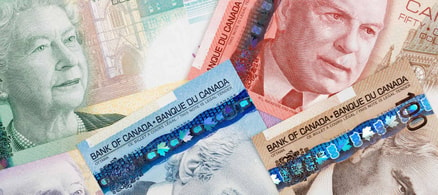Taxes depend on intent
Let’s say you day trade or mine cryptocurrency, a process that uses computers to create new digital currency. In these situations, it would be considered business income, so you’d have to report 100% of your earnings as income when filing your taxes.
Essentially, investors that trade commodities frequently, as in multiple times a day, will be taxed as if the trades were business income.
When investing in cryptocurrency casually, any profits made would be considered a capital gain, which is 50% taxable.
Let’s say you made a profit of $2,000 on your cryptocurrency trades for the year. Since you’d only be taxed on 50% of that amount, $1,000 would be added to your income for the year. The total amount of taxes you pay would then be based on your income bracket.
While this may not seem fair to new investors, these tax implications would be no different than if you were trading other commodities, such as gold or stocks.
Maximize Your Tax Refund with TurboTax Canada!
Simplify tax season with this user-friendly software. Get step-by-step guidance, maximize deductions, and file with confidence. Trusted by millions, TurboTax Canada ensures accuracy and peace of mind. Start your taxes today and get the refund you deserve
Get the tax refund you deserveAll ‘dispositions’ are taxable for cryptocurrency
To hold cryptocurrency, you need a crypto wallet that stores private keys. Even though having cryptocurrency isn’t taxable, the following events would be considered a “disposition” and lead to taxation:
- Selling or gifting cryptocurrency
- Trading or exchanging cryptocurrency for another cryptocurrency or digital asset
- Converting cryptocurrency into any government-issued currency, such as Canadian dollars
- Using cryptocurrency to buy goods or services
This is where many cryptocurrency investors get thrown off. As you can see, taxable events can still occur even when you’re not converting your cryptocurrency into cash. You would need to log your capital gains and losses every time there’s a disposition in order to figure out your tax implications.
More from Money.ca
- 4 crypto scams to watch out for?
- What is a stablecoin?
- 4 questions to ask yourself before investing in bitcoin
If you bought one cryptocurrency for $500, and then traded it for $5,000, that’s a $4,500 capital gain that you’d have to report. Remember, capital gains are taxed at 50%, so only $2,250 of your profits would be taxed.
Keep records of your transactions
Even though there are apps and exchanges that track your cryptocurrency trades, they’re not always accurate. There is a chance that not all of your trades and transaction details may get logged.
Additionally, there isn’t one central app that can store records of all cryptocurrency and NFTs. Some wallets can only hold certain types. You should record everything manually in order to have a detailed record of your investments.
Generally, you’ll want to make sure you have the following information for all of your transactions:
- The date of the transaction
- The value of the cryptocurrency at the time of the transaction
- The capital gain or loss resulting from the transaction
- Any fees associated with the transaction
You should also keep records of the following:
- Purchase and transfer receipts
- Digital wallet records and cryptocurrency addresses
- A description of the transaction with the other party (date, other party’s name, etc.)
- Accounting and legal costs
Not only will all of this information help you calculate any capital gains or losses, but you’ll also have detailed records in case the CRA asks you for more information.
Grow Your Savings Effortlessly with Moka
Automate your savings with every purchase and watch your money multiply. Moka rounds up your transactions and invests the spare change. Start building wealth effortlessly today. Join thousands of Canadians embracing financial freedom with Moka
Sign up nowNFTs are taxed just like crypto
NFTs are treated very similarly to cryptocurrency since they’re also digital assets. How you get taxed depends on the situation.
If you purchased an NFT and then made a profit from its sale, it would fall under capital gains taxes. Just like cryptocurrency, only 50% of your earnings would be taxed.
If you created or traded your own NFT, this would be considered business income. As a result, all of your profits would be taxed.
You can reduce your tax burden
Any capital losses you’ve earned through trading cryptocurrency can offset your capital gains. With this strategy, you can lower your overall tax burden.
That said, capital losses can only be claimed against capital gains. In other words, you can’t just claim losses against your income from a paycheque and expect a lower tax bill. However, any unused capital losses can be carried forward to another tax year in order to be used later when you do have capital gains.
Another way to reduce your tax burden is to donate some of your cryptocurrency to registered charities that accept crypto. The charity can then provide you with a receipt that you can use to reduce your taxable income.
Finally, the basic personal amount for individuals in 2021 is $13,808. If your total income, including capital gains from cryptocurrency, was below that threshold, you don’t have to pay any taxes.
Always report your earnings
Some investors mistakenly assume that gains from cryptocurrencies or NFTs don’t need to be reported since they’re not legal tenders, and are not tied to any central bank. That’s simply not the case.
The CRA sees cryptocurrency as a commodity, so you need to report any capital gains and pay your fair share of taxes.
Even though trading cryptocurrency may appear anonymous, it’s still trackable by the CRA. If you purposely didn’t report your earnings, you’d be committing tax evasion. The CRA takes this very seriously and you can be fined or possibly face a prison sentence.
Sponsored
Trade Smarter, Today
With CIBC Investor's Edge, kick-start your portfolio with 100 free trades and up to $4,500 cash back.







